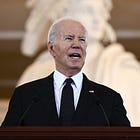The Antisemitic Fight Against Antisemitism
A Passover plea to let Jewish people define our own values
The first time I hosted a Passover Seder, I was the only Jewish person at the table. It wasn’t intentional. I was establishing a life for myself in a new city where I didn’t know many people, let alone many Jews. It just so happened that the people who were all gentiles. But in a sense it was fitting.
As someone who connects to my Jewish heritage more through culture and traditions than pious faith, I see including goyim in the holiday festivities as a given — people of all creeds can appreciate latkes at Hanukkah or brisket on Rosh Hashanah. Yet Pesach in particular is about proclaiming and sharing our narrative in our own words. The collection of texts that takes attendees through the Seder rituals is called the Haggadah, which literally means “telling.” Most of evening is spent recounting the Exodus for anyone who may not know the story, through readings and songs and group activities. The section on the Four Children offers metatextual guidance on how to introduce newcomers to our traditions. At the end of the night we pour an extra cup of wine and open the door to symbolize that all are welcome at our table.
The Passover holiday is, in so many words, a celebration of the Jewish people’s right to define and express our own values. Which feels like a radical idea right now.
Over the last 18 months, influential gentiles from across the American political spectrum have worked to identify the Jewish religion with uncritical support for the Israeli military.
The conflation of our Judaism with Zionist jingoism, both from within and outside the Jewish community, is neither new nor mysterious — I need not attempt rehashing the history of this here — but the ubiquity of the association has ratcheted up since the attacks of October 7. There is no other foreign government for whom disbelieving that their actions are beyond reproach is considered discrimination against the state religion. (No one claims that criticizing Keir Starmer’s policies is offensive to Anglicans.) And insisting that speaking against Israeli military action is definitionally antisemitic also brazenly ignores how our people actually feel about it.
I am Jewish. From the immediate aftermath of Hamas’ attacks, I have been vocal about disavowing the wanton destruction of Gaza (to say nothing of IDF’s recent operations in the West Bank, Lebanon, and Syria), about the impropriety of weaponizing our own millennia of oppression to justify the immiseration of another people, and about the difference between performative gentile allyship and the awkward, introspective work that truly fighting antisemitism requires. Most of the Jews I have talked to are appalled by the violence being waged in our name. The strongest advocate in the Senate against the destruction, Bernie Sanders, is Jewish. The most prominent group organizing protests against the IDF’s actions is called Jewish Voice for Peace. Poll after poll have shown that majorities of Jewish Americans support a ceasefire, oppose unconditional arms sales to the IDF, and do not believe it is antisemitic to criticize the Israeli government.
In the spirit of the season, as our traditions command us to tell our story to all who will listen, there should be no ambiguity about this: Gentiles dishonestly claiming to represent the interests of Jewish people to further their own ideological aims is not just tokenizing and appropriative. It is antisemitic.
While this pernicious ideology has long festered on the right, no one in recent years has done more to build bipartisan consensus for this tokenism than Joe Biden. The then-leader of the country with the largest Jewish community in the world repeatedly claimed that his constituents’ safety was Israel’s responsibility, not his. Biden spent last spring inveighing against the alleged antisemitism of antiwar demonstrations, while refusing to acknowledge that the participants were disproportionately Jewish. He condemned the harassment of Jewish students in the abstract yet was steadfastly unmoved by the brutality police and counterprotestors visited upon peaceful Jewish students. His press secretary compared these demonstrators, including the Jewish Americans attempting to reclaim their own identity from a movement that seeks to tokenize them, to white supremacists.
Donald Trump clearly understands that leaders of religious states do not speak for all of their faiths’ followers, since his Vice President is publicly spatting with the Pope. Which betrays his approach to combatting antisemitism as not just a dangerous escalation but plainly disingenuous. Distilling Trump’s dizzying history of bigotry into a few examples is a Sisyphean task: the first that come to mind are identifying “very fine people” at a Neo-Nazi rally, announcing he would blame the Jews if he lost the 2024 election, and canceling observations of Holocaust Remembrance Day. One of his two highest-profile advisors keeps endorsing antisemitic lies on his social media platform and celebrated Trump’s inauguration with multiple Nazi salutes. The other claimed COVID-19 was targeted to spare the Ashkenazi community and that vaccine mandates were worse than the Holocaust. Yet thanks to the Washington consensus that Judaism is synonymous with Zionism, Trump has successfully branded himself as not just an ally but a warrior against antisemitism.
This framing — which has received distressingly little pushback — now undergirds many of the Trump administration’s most dangerous policies. Abducting and detaining legal residents who had spoken against the war in Gaza, like Mahmoud Khalil and Rümeysa Öztürk. Defunding institutions of higher learning that were deemed insufficiently hostile to campus protestors unless they acquiesce to ideological demands. Screening social media for criticism of Israel to identify deportation targets. And of course the continued full-throated support of a military campaign that has already claimed tens of thousands of civilian lives.
This is supposed to be for my safety?
Yes, there are Zionist Jews who happily endorse this definition of antisemitism. Some in our community cheered the arrest of Khalil, just as they did for the crackdowns against student protestors a year ago. The Anti-Defamation League now classifies critiques of Israel as antisemitic incidents while handwaving away Elon Musk’s Nazi salutes as “an awkward gesture in a moment of enthusiasm,” a pivot that is costing a respected authority on combatting anti-Jewish hatred both its credibility and its staff. A month after the October 7 attacks, Chuck Schumer co-headlined a rally with John Hagee, an infamous demagogue so bigoted that John McCain disavowed his endorsement. Evidently Schumer, the highest-ranking Jewish politician in American history, is willing to make bedfellows with anyone who supports Israel — even if they believe “God sent Hitler” to hasten Jews’ migration there.
I would never accuse these members of our community of not being truly Jewish based on how they interpret our professed ideals, a principle not all of them reciprocate towards those critical of Israel. But I would ask them, and any gentiles who believe in good faith that Zionism is the primary criterion of anti-antisemitism, to think through this Faustian bargain. At a time when anti-Jewish hatred is so prevalent — including among some pro-Palestinian activists, a nuance that gets obscured while debating the broad allegations against the movement at large — will it make us safer if gentiles are conditioned not to take allegations of antisemitism seriously? Is it in our interest for any goyim to act as gatekeepers for Jewish identity, let alone flagrant bigots who insist that bombing hospitals and embargoing humanitarian aid represent our values? When reactionary governments use contrived ideological grounds to target ethnic and religious minorities, does that usually turn out well for us?
To borrow the phrasing of the Haggadah: On most nights we understand that our millennia of persecution give us common cause with anyone suffering from oppression, and that simmering hatred for other marginalized groups eventually finds its way to us. Why is this night different from all other nights?
My alma mater is among the educational institutions Trump is threatening to defund. Just as broken clocks are right twice a day, I agree that Jewish students were treated unfairly amid last year’s campus protests — though for a very different reason than he asserts.
In October, a group of Jewish students celebrated the harvest festival of Sukkot by sleeping outside in a sukkah, a traditional temporary structure where celebrants spend time during the holiday — which in this case was decorated to protest the war in Gaza. In the past, students were allowed to spend the night on the green for Sukkot without incident; I too have done so for far less valid reasons than religious observation. Yet last year, campus security woke the observing students in the middle of the night and threatened them with conduct violations for sleeping in their sukkah.
Harassing Jewish people for peacefully celebrating their faith in a way that confounds the stereotypes to which gentiles would prefer that we conform: A fitting metaphor for this political moment.
History remembers those who decided our people’s expressions of identity were politically inconvenient. My Jewishness is not defined by Benjamin Netanyahu, and it’s certainly not up to Biden or Trump. I wonder what these gentile demagogues would think if they attended a Seder and heard the Haggadah’s teachings: That we must proclaim our own stories and values, that we cannot turn away from any people’s injustice and suffering, and that temperamental border-control-obsessed despots with strong opinions about how Jews should behave do not have our best interests at heart. Perhaps then they would let my people go free from their shameless tokenism.





